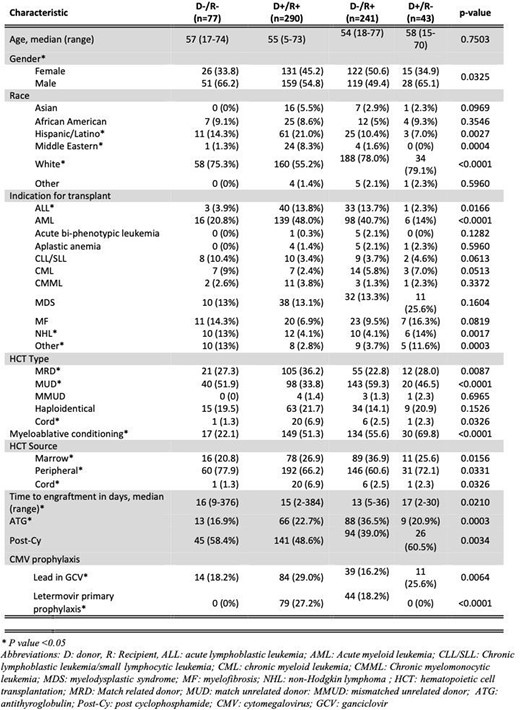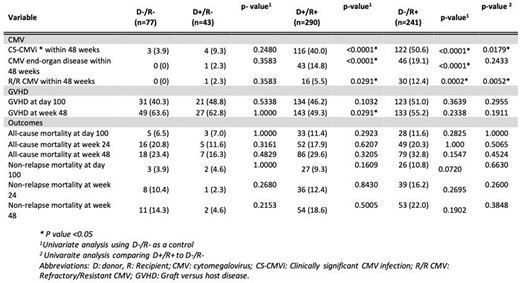-
PDF
- Split View
-
Views
-
Cite
Cite
Oscar Morado Aramburo, Amy Spallone, Fareed Khawaja, Joseph Sassine, Krithia Srinivasan, Anthony J Febres-Aldana, Terri Lynn Shigle, Gabriella Rondon, Jeremy Ramdial, Elizabeth Shpall, Ella Ariza-Heredia, Roy F Chemaly, 2121. The Impact of Donor CMV Serostatus on Outcomes of CMV Infections in the Era of Letermovir, Open Forum Infectious Diseases, Volume 9, Issue Supplement_2, December 2022, ofac492.1742, https://doi.org/10.1093/ofid/ofac492.1742
Close - Share Icon Share
Abstract
Cytomegalovirus (CMV) infection is a frequent complication after allogeneic hematopoietic cell transplant (allo-HCT) and may increase the risk of other viral infections through its immunomodulatory effects. Donor CMV serology (seropositive [D+] or seronegative donor [D-]) in CMV-seropositive (R+) or seronegative recipients (R-) may impact outcomes post allo-HCT. We analyzed the significance of donor CMV serostatus in a large cohort of alloHCT recipients.
This is a single-center, retrospective cohort study of 651 allo-HCT recipients cared for at our institution between March 2016 and December 2018. Data on baseline demographics, transplant characteristics, preventive strategies, CMV infection characteristics, and transplant-related outcomes (development of graft versus host disease (GVHD), all-cause mortality, and non-relapse mortality) were collected. A univariate analysis was performed for outcomes of interest using CMV serostatus D-/R- as a control group.


Allo-HCT recipients with CMV seronegative donor and recipient had less CMV related complications and a trend towards better survival when compared to D-/R+ allo-HCT. CMV D-/R+ HCT recipients had greater CMV related complications when compared to CMV D+/R+ HCT recipients, possibly due to the protective affect of donor seropositivity.
Terri Lynn Shigle, PharmD, BCOP, Takeda: Advisor/Consultant Gabriella Rondon, MD, Omeros: Advisor/Consultant Elizabeth Shpall, MD, Adaptimmune: Advisor/Consultant|Affimed: License agreement|Axio: Advisor/Consultant|Bayer Helathcare Pharmaceuticals: Honoraria|Fibroblasts and FibrioBiologics: Advisor/Consultant|Navan: Advisor/Consultant|NY Blood Center: Advisor/Consultant|Takeda: License agreement Ella Ariza-Heredia, MD, MERCK: Grant/Research Support Roy F. Chemaly, MD/MPH, Karius: Advisor/Consultant|Karius: Grant/Research Support.
Author notes
Session: 234. Infections in Immunocompromised Individuals
Saturday, October 22, 2022: 12:15 PM
- graft-versus-host disease
- conditioning (psychology)
- consultants
- demography
- disclosure
- licensure
- serologic tests
- virus diseases
- infections
- cytomegalovirus infections
- cytomegalovirus
- mortality
- study of serum
- transplantation
- allogeneic hematopoietic stem cell transplant
- ulipristal
- prevention
- univariate analysis
- letermovir
- donors
- doctor of pharmacy





Comments